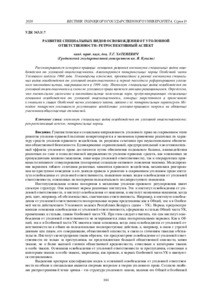Пожалуйста, используйте этот идентификатор, чтобы цитировать или ссылаться на этот ресурс:
https://elib.psu.by/handle/123456789/25038Полная запись метаданных
| Поле DC | Значение | Язык |
|---|---|---|
| dc.contributor.author | Хатеневич, Т. Г. | - |
| dc.contributor.author | Khatsianevich, T. | - |
| dc.date.accessioned | 2020-06-10T11:32:25Z | - |
| dc.date.available | 2020-06-10T11:32:25Z | - |
| dc.date.issued | 2020 | - |
| dc.identifier.citation | Хатеневич, Т. Г. Развитие специальных видов освобождения от уголовной ответственности: ретроспективный аспект / Т. Г. Хатеневич // Вестник Полоцкого государственного университета. Серия D, Экономические и юридические науки. - 2020. - № 5. - С. 104-112. | ru_RU |
| dc.identifier.issn | 2070-1632 | - |
| dc.identifier.uri | https://elib.psu.by/handle/123456789/25038 | - |
| dc.description.abstract | Рассматриваются историко-правовые основания развития института специальных видов освобождения от уголовной ответственности. Анализируются поощрительные нормы Особенной части Уголовного кодекса 1960 года. Установлены изменения, произошедшие в рамках института специальных видов освобождения от уголовной ответственности в период последнего реформирования уголовного законодательства, завершившегося в 1999 году. Институт специальных видов освобождения от уголовной ответственности в системе уголовного права является активно развивающимся. Определено, что значительное увеличение в законодательстве количества норм, предусматривающих специальные основания освобождения от уголовной ответственности, которые закрепляются в примечаниях к статьям и главам Особенной части уголовного закона, связано с их поощрительным характером. Методом поощрения усиливается регулятивное воздействие уголовно-правового запрета на обязанных участников общественных отношений.= The article discusses the historical and legal grounds for the development of the institute of special types of refusal from criminal responsibility. The incentive norms of the Special Part of the 1960 Criminal Code are analyzed. The changes that occurred within the framework of the institute of special types of refusal from criminal responsibility were established during the last reform of the criminal law, which ended in 1999. The institute of special types of refusal from criminal responsibility in the criminal law system is actively developing. It has been determined that a significant increase in the number of rules in the legislation providing for special grounds for exemption from criminal liability, which are enshrined in the notes to the articles and chapters of the Special Part of the Criminal Law, is related to their encouraging nature. The method of encouragement enhances the regulatory impact of the criminal law ban on obliged participants in public relations. | ru_RU |
| dc.language.iso | ru | ru_RU |
| dc.publisher | Полоцкий государственный университет | ru_RU |
| dc.relation.ispartof | Веснік Полацкага дзяржаўнага ўніверсітэта. Серыя D, Эканамічныя і юрыдычныя навукі | be_BE |
| dc.relation.ispartof | Herald of Polotsk State University. Series D, Economics and law sciences | en_EN |
| dc.relation.ispartof | Вестник Полоцкого государственного университета. Серия D, Экономические и юридические науки | ru_RU |
| dc.relation.ispartofseries | Серия D, Экономические и юридические науки;2020. - № 5 | - |
| dc.rights | open access | ru_RU |
| dc.subject | Государственный рубрикатор НТИ - ВИНИТИ::ОБЩЕСТВЕННЫЕ НАУКИ::Государство и право. Юридические науки | ru_RU |
| dc.subject | Институт специальных видов освобождения от уголовной ответственности | ru_RU |
| dc.subject | Ретроспективный аспект | ru_RU |
| dc.subject | Поощрительные нормы | ru_RU |
| dc.subject | Institute of special types of exemption from criminal liability; | ru_RU |
| dc.subject | Retrospective aspect | ru_RU |
| dc.subject | Incentive norms | ru_RU |
| dc.title | Развитие специальных видов освобождения от уголовной ответственности: ретроспективный аспект | ru_RU |
| dc.title.alternative | Development of Special Types of Exemption From Criminal Liability: the Retrospective Aspect | ru_RU |
| dc.type | Article | ru_RU |
| dc.identifier.udc | 343.3/.7 | - |
| Располагается в коллекциях: | 2020, № 5 | |
Файлы этого ресурса:
| Файл | Описание | Размер | Формат | |
|---|---|---|---|---|
| 104-112.pdf | 217.47 kB | Adobe PDF |  Просмотреть/Открыть |
Все ресурсы в архиве электронных ресурсов защищены авторским правом, все права сохранены.